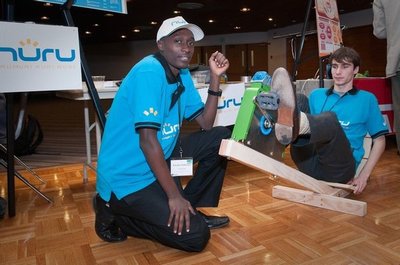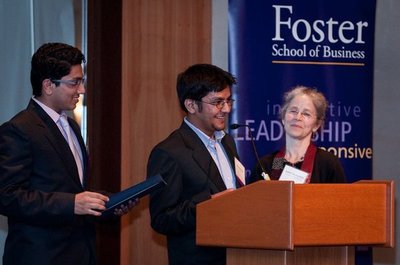March 11, 2010
Grand prize team lights up UW global social entrepreneurship competition
The first time Charles Ishimwe left Rwanda was when he entered the Sixth Annual Global Social Entrepreneurship Competition (GSEC) sponsored by the UW Foster School of Business.
The competition, held March 1-5, was fierce — 161 teams from 36 countries going after $20,000 in prize money.
For Ishimwe, it was a good first trip away from home. He and his teammate, Max Fraden a medical student from Massachusetts, walked away with the $10,000 grand prize, the second place global health prize of $2,500, the Investor’s Award of $500 and an all-expense paid trip to a week-long entrepreneurial boot camp in San Francisco.
Their idea, Nuru Light, is a portable on-demand (POD) LED light to replace dim and unhealthy kerosene lights used by 90 percent of homes in Rwanda, said Ishimwe. Nuro is Swahili for light.
Consumers would be able to buy or rent POD lights directly from vendors who will provide recharging services for a fee. Pedal generators recharge lights at a rate of five lights in 20 minutes.
“We’re avoiding kerosene and also creating jobs for people,” said Ishimwe.
The Nuru Light team is an international collaboration between Ishimwe from Adventist University of Central Africa in Rwanda and Fraden from University of Massachusetts Medical School. They met while working on a United Nations project.
POD lights are less expensive than kerosene and are appealing to 4 billion people in the world where electricity is non-existent, limited or erratic.
And that was just one of the ideas.
The weeklong competition narrowed down applicants to five finalist teams — from Bangladesh, Canada, China, India, Rwanda and the United States — which pitched their ideas to a lineup of judges in the final round.
“What’s inspiring is that here you have some of the best and brightest students from around the world,” said Judy Wasserheit, vice chair of the Department of Global Health. “They’re starting their career at a time where there’s so much economic turmoil. I think they get it that this is a time that demands a radically new way of doing business.”
Bill Gates Sr., the keynote speaker at the awards banquet March 4, quoted his son from a famous speech three years ago calling for “creative capitalism.”
“Once you know about suffering, you can’t help but to alleviate it,” he said.
The Department of Global Health collaborated with the Foster School of Business to support two Global Health prizes in the amounts of $5,000 and $2,500.
“[This] is one of the most exciting and inspiring things we do at this university,” Wasserheit said.
The first place Global Health prize went to ToucHb, a team from Maharashtra University of Health Sciences in India, for their prickless anemia scanner for use by village health workers in India to measure, diagnose, monitors and screen for anemia.
The team has been working on the device for three years.
“Every minute a women dies of childbirth or pregnancy-related causes and 40 percent of that is attributed to anemia,” said Abhishek Sen of ToucHb during the final round of the competition. “It’s really tragic because anemia can be easily treatable.”
The second place prize went to Nuru Light for the ancillary health benefits of POD lights, including decreased exposure to particulate matter and lowering the risk of kerosene burning.
Other teams that had a global health focus included NASH Equilibrium from Bangladesh that addressed widespread diarrhea using inexpensive cassava roots to produce a rehydration saline, and Gift of Sound from University of Michigan that created a low-cost digital hearing aid with easy-to-access diagnostic kiosks.
“I thought [NASH Equilibrium] had a project that had a lot of potential and I think in a competition like this, there are the prizes themselves that mean a lot but there’s a lot of learning and growth that happens just from participation in the competition,” Wasserheit said.
GSEC brought together nine coaches, 17 mentors and more than 30 judges to share their expertise with the teams throughout the week. They came from corporations, nonprofits and the UW community.
“What I appreciated the most was the massive amount of input we got,” said Fraden of Nuru Light. “It seemed like in the course of a day, we changed perspectives on our business plan 10 or 20 times.”
In a spur-of-the-moment decision, judges from the final round pooled their money together to create a $3,000 Judges’ Choice Award given to Malo Traders, which aimed to use technology to minimize the risk of post-harvest losses for small-scale rice farmers in Mali.
Additionally, a representative from the National Collegiate Inventors and Innovators Alliance (NCIIA) gave three teams a week-long entrepreneurial boot camp in San Francisco to work on their ideas. The winners of this $1,500 award each were: Malo Traders, Gift of Sound and Nuru Light.
View the list of other winners.
Bobbi Nodell, communications specialist at the UW Department of Global Health, contributed to this story.




